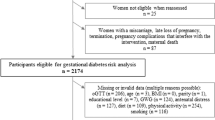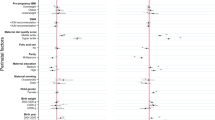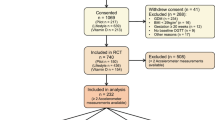Abstract
Background/Objective:
Well-being has been linked to the quality of diet and lifestyle in adults; however, there is a paucity of data in pregnancy. The aim of this study was to examine the relationship between well-being and socioeconomic status, diet and lifestyle during pregnancy and to consider the effect of intervention with low glycaemic index (GI) diet on well-being.
Subjects/Methods:
This was a cohort analysis of 619 participants of the ROLO study (Randomised cOntrol trial of LOw GI diet versus no dietary intervention to prevent recurrence of fetal macrosomia). The following data were collected: educational attainment, dietary intakes (food frequency questionnaire), physical activity (self-reported) and well-being (WHO-5-Item Wellbeing Index—expressed as a percentage).
Results:
Well-being was positively associated with education and physical activity. Third-level education was associated with a 3.07-point higher well-being percentage score, and each day that an individual achieved >30 min walking per week was associated with a 1.10-point increase in percentage well-being score, Radj2 2.4% (F=7.260, P=0.001). The intervention low GI group had a significantly lower percentage well-being score than the usual diet group (56.3% vs 59.9%, P=0.015). No correlation was noted between well-being and GI status calculated from food diaries (P=0.469). Well-being was not associated with micronutrient intake.
Conclusions:
Well-being in pregnancy was independently and positively associated with education and physical activity and negatively associated with low GI dietary intervention. These findings have significance not only for women at risk of low mood but also for healthcare professionals when counselling women about the importance of healthy lifestyle in pregnancy.
This is a preview of subscription content, access via your institution
Access options
Subscribe to this journal
Receive 12 print issues and online access
$259.00 per year
only $21.58 per issue
Buy this article
- Purchase on Springer Link
- Instant access to full article PDF
Prices may be subject to local taxes which are calculated during checkout
Similar content being viewed by others
References
Walsh JM, McGowan CA, Mahony R, Foley ME, McAuliffe FM . Low glycaemic index diet in pregnancy to prevent macrosomia (ROLO Study): randomised control trial. Br Med J 2012; 345: e5605.
Lancaster CA, Gold KJ, Flynn HA, Yoo H, Marcus SM, Davis MM . Risk factors for depressive symptoms during pregnancy: a systematic review. Am J Obstet Gynecol 2010; 202: 5–14.
Bennett HA, Einarson A, Taddio A, Koren G, Einarson TR . Prevalence of depression in pregnancy: a systematic review. Obstet Gynecol 2004; 103: 698–709.
Studd J, Nappi RE . Reproductive depression. Gynaecol Endocrinol 2012; 28: S42–S45.
Allison KC, Wrotniak BH, Paré E, Sarwer DB . Psychosocial characteristics and gestational weight change among overweight, African American pregnant women. Obstet Gynaecol Int 2012; 2012, doi:10.1155/2012/878607.
Bodnar LM, Wisner KL . Nutrition and depression: implications for improving mental health among childbearing-aged women. Biol Psych 2005; 58: 679–685.
Poudevigne MS, O'Connor PJ . A review of physical activity patterns in pregnant women and their relationship to psychological health. Sports Med 2006; 36: 19–38.
Teychenn M, Ball K, Salmon J . Physical activity and likelihood of depression in adults: a review. Prev Med 2008; 46: 397–411.
Ströhle A . Physical activity, exercise, depression and anxiety disorders. J Neural Transm 2009; 116: 777–784.
Da Costa D, Rippen N, Dritsa M, Ring A . Self-reported leisure-time, physical activity during pregnancy and relationship to psychological well-being. J Psychomet Obstet Gynaecol 2003; 24: 111–119.
Goodwin A, Astbury J, McMeeken J . Body image and psychological well-being in pregnancy. A comparison of exercisers and non-exercisers. Aust N Z J Obstet Gynaecol 2000; 40: 442–447.
Evenson KR, Savitz DA, Huston SL . Leisure-time physical activity among pregnant women in the US. Paediatr Perinat Epidemiol 2004; 18: 400–407.
Macera CA, Ham SA, Yore MM, Jones DA, Ainsworth BE, Kimsey CD et al. Prevalence of physical activity in the United States: behavioural risk factor survelliance system, 2001. Prev Chronic Dis 2004; 2: 17.
Walsh JM, McGowan CA, Byrne J, McAuliffe FM . Prevalence of physical activity among healthy pregnant women in Ireland. Int J Gynaecol Obstet 2011; 114: 154–155.
Committee on Obstetric Practice. ACOG committee opinion. Exercise during pregnancy and the postpartum period. Number 267, January 2002. American College of Obstetricians and Gynecologists. Int J Gynecol Obstet 2002; 77: 79–81.
Poudevigne MS, O’Connor PJ . Physical activity, mood, and self-esteem during pregnancy. Med Sci Sports Exerc 2005; 37: 1374–1380.
Williams A, Reilly T, Campbell I, Sutherst J . Investigations of changes in responses to exercise and in mood during pregnancy. Ergonomics 1988; 31: 1539–1549.
Tendais I, Figueiredo B, Mota J, Conde A . Physical activity, health-related quality of life and depression during pregnancy. Cad Saúde Pública 2011; 27: 219–228.
Clarke P, Rousham E, Gross H, Halligan A, Bosio P . Activity patterns and time allocation during pregnancy: a longitudinal study of British women. Ann Hum Biol 2005; 32: 247–258.
Hueston WJ, Kasik-Miller S . Changes in functional health status during normal pregnancy. J Fam Practit 1998; 47: 209–212.
Leung BMY, Kaplan BJ . Perinatal depression: prevalence, risks, and the nutrition link—a review of the literature. J Am Diet Assoc 2009; 109: 1566–1575.
StrΦm M, Mortensen EL, Halldorsson TI, Thorsdottir I, Olsen SF . Fish and long-chain n-3 polyunsaturated fatty acid intakes during pregnancy and risk of postpartum depression: a prospective study based on a large national birth cohort. Am J Clin Nutr 2009; 90: 141–155.
Bodnar LM, Wisner KL, Luther JF, Powers RW, Evans RW, Gallaher MJ et al. An exploratory factor analysis of nutritional biomarkers associated with major depression in pregnancy. Public Health Nutr 2012; 15: 1078–1086.
Institute of Medicine. Weight Gain During Pregnancy: Re-Examining the Guidelines. Report of the Committee to Reexamine Pregnancy Weight Guidelines. National Academies Press: Washington, DC, USA, 2009.
Webb JB, Siega-Riz AM, Dole N . Psychosocial determinants of adequacy of gestational weight gain. Obesity 2008; 17: 300–309.
Walsh J, Mahony R, Foley M, McAuliffe FM . A randomised control trial of low glycemic index carbohydrate diet versus no dietary intervention in the prevention of recurrence of macrosomia. BMC Pregnancy Childbirth 2010; 10: 16.
Morgan K, McGee H, Watson D, Perry I, Barry M, Shelley E et al SLÁN 2007: Survey of Lifestyle, Attitudes & Nutrition in Ireland. Main Report. Department of Health and Children: Dublin, Ireland, 2008.
Riboli E, Kaaks R . The EPIC project: rationale and study design. Int J Epidemiol 1997; 26: S6–S13.
Harrington J . Validation of a Food Frequency Questionnaire as a tool for assessing nutrient intake. MA Thesis, Health Promotion. National University of Ireland: Galway, 1997.
McGowan CA, McAuliffe FM . Maternal dietary patterns and associated nutrient intakes during each trimester of pregnancy. Public Health Nutr 2013; 16: 97–107.
Coustan DR, Carpenter MW . The diagnosis of gestational diabetes. Diabetes Care 1998; 21: S5–S8.
Walsh JM, Mahony R, Byrne J, Foley M, McAuliffe FM . The association of maternal and fetal glucose homeostasis with fetal adiposity and birthweight. Eur J Obstet Gynaecol 2011; 159: 338–341.
World Health Organisation (WHO), Regional Office for Europe. Well-being Measures in Primary Health Care. The DepCare Project: Stockholm, Sweden, 2008.
Bech P, Olsen L, Kjoller M, Rasmussen N . Measuring well-being rather than the absence of distress symptoms: a comparison of the SF-36 mental health subscale and the WHO-five well-being scale. IntJ Methods Psych Res 2003; 12: 85–91.
DiPietro JA, Christensen AL, Costigan KA . The pregnancy experience scale—brief version. J Psychosom Obstet Gynaecol 2008; 29: 262–267.
Lowe B, Spitzer R, Grafe K, Kroenke K, Quenter A, Zipfel S . Comparative validity of three screening questionnaires for DSM-IV depressive disorders and physicians diagnoses. J Affect Disord 2004; 78: 131–140.
Ryan D, Milis L, Misri N . Depression during pregnancy. Can Fam Physician 2005; 51: 1087–1093.
Bunevicius R, Kusminskas L, Bunevicius A, Nadisauskiene RJ, Jureniene K, Pop VJM . Psychosocial risk factors for depression during pregnancy. Acta Obstet Gynaecol 2009; 88: 599–605.
Stathopoulou G, Powers MB, Berry AC, Smits JAJ . Exercise interventions for mental health: a quantitative and qualitative review. Clin Psychol Sci Pract 2006; 13: 179–193.
Kanning M, Schlicht W . Be active and become happy: an ecological momentary assessment of physical activity and mood. J Sport Exerc Psychol 2010; 32: 253–261.
Da Costa D, Ireland K . Perceived benefits and barriers to leisure-time physical activity during pregnancy in previously inactive and active women. Women Health 2013; 53: 185–202.
Sathyanarayana Rao TS, Asha MR, Ramesh BN, Jagannatha Rao KS . Understanding nutrition, depression and mental illness. Indian J Psychiatry 2008; 50: 77–82.
Cheatham RA, Roberts SB, Das SK, Gilhooly CH, Golden JK, Hyatt R et al. Long-term effects of provided low and high glycaemic load low energy diets on mood and cognition. Physiol Behav 2009; 98: 374–379.
Benton D, Nabb S . Carbohydrate, memory and mood. Nutr Rev 2003; 61: S61–S67.
Hickey CA, Cliver SP, Goldenberg RL, McNeal SF, Hoffman FJ . Relationship of psychosocial status to low prenatal weight gain among nonobese black and white women delivering at term. Obstet Gynecol 1995; 86: 177–183.
Walker LO, Kim M . Psychosocial thriving during late pregnancy: relationship to ethnicity, gestational weight gain, and birth weight. J Obstet Gynaecol Neonatal Nurs 2002; 31: 263–274.
Laraia BA, Siega-Riz AM, Dole N, London E . Pregravid weight is associated with prior dietary restraint and psychosocial factors during pregnancy. Obesity 2009; 17: 550–558.
Hurley KM, Caulfield LE, Sacco LM, Costigan KA, Dipietro JA . Psychosocial influences in dietary patterns during pregnancy. J Am Diet Assoc 2005; 105: 963–966.
Acknowledgements
This study was supported by the Health Research Board Ireland, the Health Research Centre for diet, nutrition and diabetes Ireland and the National Maternity Hospital Medical Fund. The research leading to these results has also received funding from the European Union's Seventh Framework Programme (FP7/2007–2013), project EarlyNutrition under grant agreement no. 289346.
Author information
Authors and Affiliations
Corresponding author
Ethics declarations
Competing interests
The authors declare no conflict of interest.
Rights and permissions
About this article
Cite this article
Horan, M., McGowan, C., Doyle, O. et al. Well-being in pregnancy: an examination of the effect of socioeconomic, dietary and lifestyle factors including impact of a low glycaemic index dietary intervention. Eur J Clin Nutr 68, 19–24 (2014). https://doi.org/10.1038/ejcn.2013.212
Received:
Revised:
Accepted:
Published:
Issue Date:
DOI: https://doi.org/10.1038/ejcn.2013.212
Keywords
This article is cited by
-
Associations of Mediterranean diet with psychological ill-being and well-being throughout the pregnancy course: The GESTAFIT project
Quality of Life Research (2022)
-
Maternal dietary quality, inflammatory potential and childhood adiposity: an individual participant data pooled analysis of seven European cohorts in the ALPHABET consortium
BMC Medicine (2021)
-
Maternal low glycaemic index diet, fat intake and postprandial glucose influences neonatal adiposity – secondary analysis from the ROLO study
Nutrition Journal (2014)



